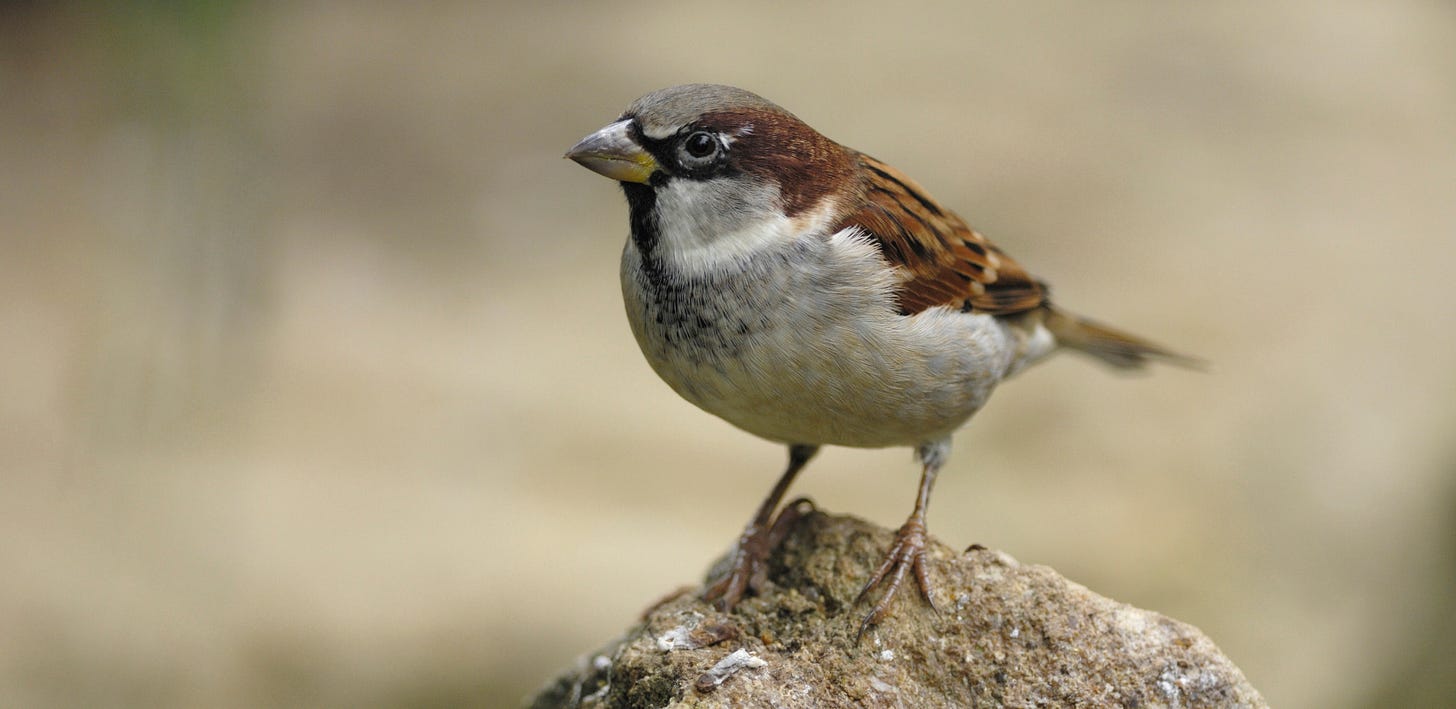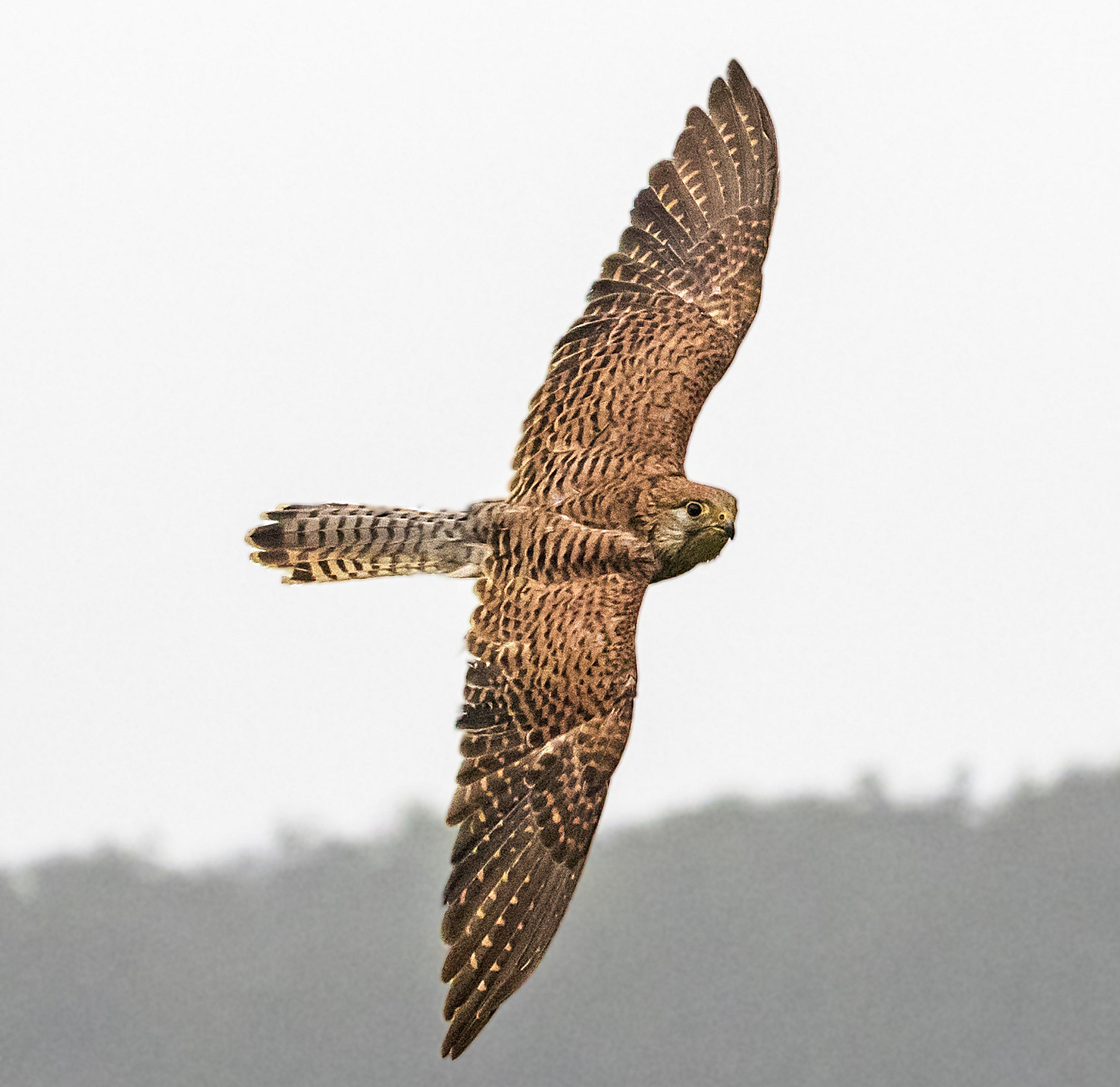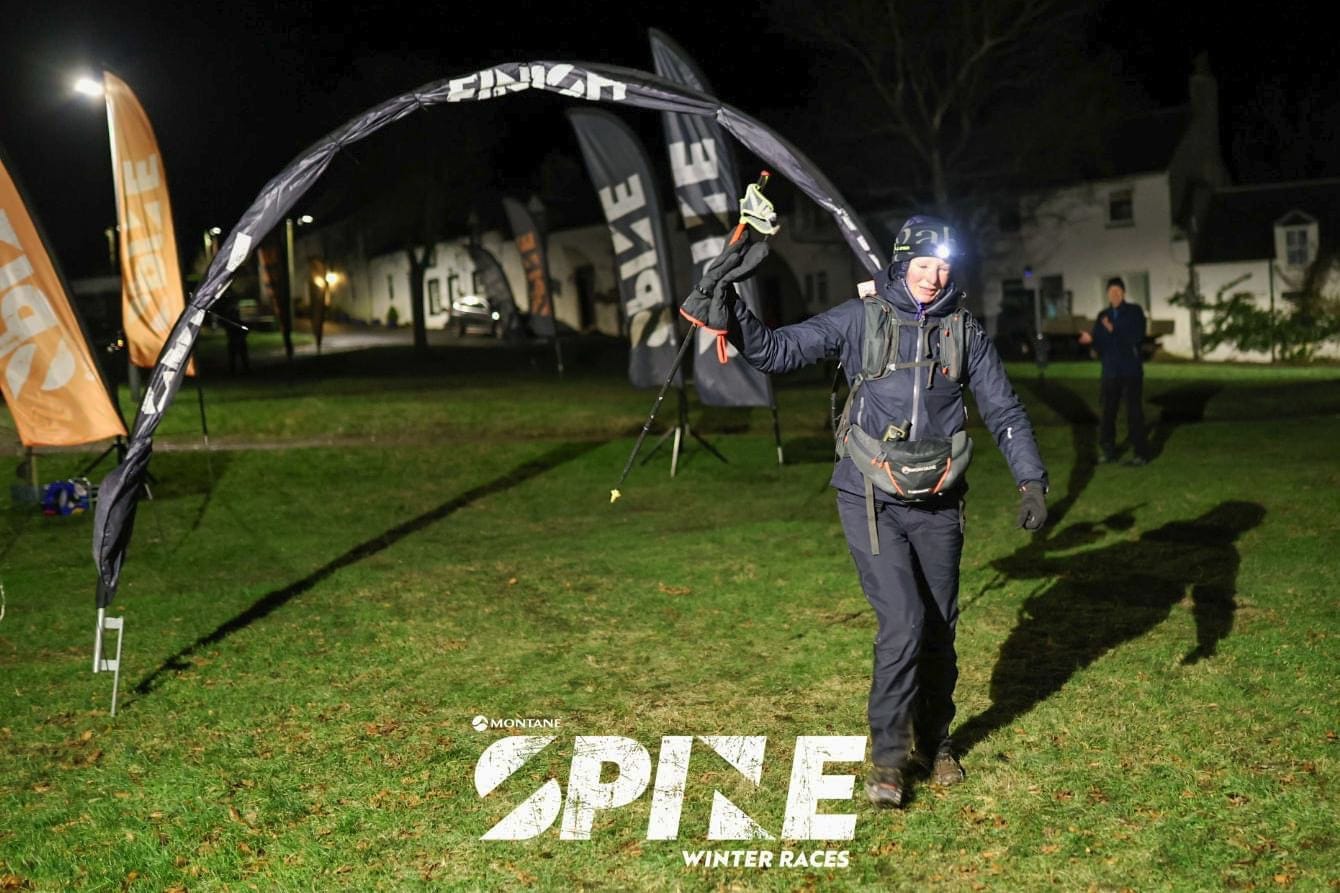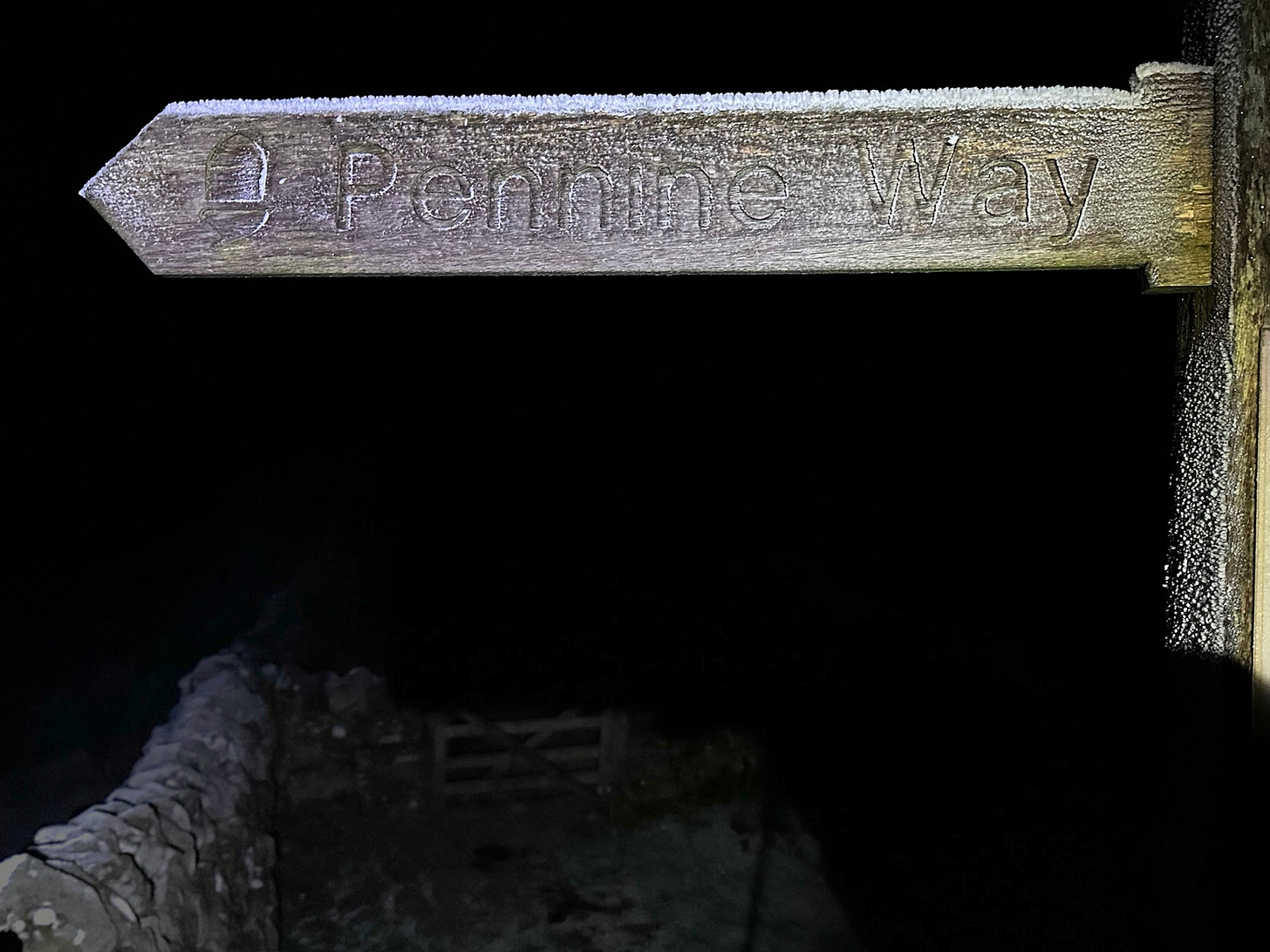Friends in Green Spaces: Sun 21st Jan 2024
Big Garden Birdwatch. Sheffield's green space groups. More pounds for parks. Winter Spine Race ☑️ + condensed listings.
Morning. Some short features and an excuse to run some great wildlife photos today, as I’ve had a busy weekend - this is my third post since Friday, and I can only do that thanks to the wonderful 180+ folk who have dug in their pockets for the annual subscription of £3.67 per month, and said:
“Yes! We appreciate your hard work posting all these interesting things about wild and wonderful Sheffield, and know you can’t do all that for nothing, so I’ll stump up the cost of a multipack of Quavers to get more stuff and help you keep going!”
Could you do the same? Yes please button below, lovely readers.
Big Garden, Yard, Park or Balcony Birdwatch
This coming weekend, it’s time to spend an hour at one of the world’s biggest citizen science initiatives, the RSPB Big Garden Birdwatch.
After running for 45 years, these days over half a million people take part every January, checking out their garden, local park, yard or balcony and counting the numbers of any species of bird they see.
The key is to set yourself up properly, I’ve learned from visiting January birdwatching citizens over the years. A teapot ready, ideally a comfy chair, biscuits and binoculars. Your kids may or may not be amenable to an hour sat in one place counting House Sparrows, but they can have a go at school instead, anytime between 8th January and 19th February.
The gremlin in all this good natured science is the domestic cat, which may not notice that you’re about to start a crucial experiment in its personal hunting territory. (Some birdwatchers use water pistols or even high pitched alarms to keep cats away, and one I met a few years ago suggested a set of mini landmines.)
The experiment has registered the decline and rise of various species: in Sheffield, like many parts of the UK, Wood Pigeons now appear more often, and House Sparrows are still likely to turn up in many gardens, but far fewer than 45 years ago (the RSPB say the UK has lost 22 million House Sparrows from UK fields and gardens since 1966).
Goldfinches are up, but Chaffinches and Greenfinches are down, partly due to Trichomonosis disease, which can be spread by rotting food waste and dirty water. (So clean your feeders and bird baths as often as you can).
One of the biggest declines is the Song Thrush, down 80% since the first Garden Birdwatch in 1979. Some say the cat is one of the biggest threats to such songbirds.
“We can’t really have cat culls, so people are going to lose their songbirds,” said one birdwatcher to me a few years ago.
The Sheffield RSPB group told me that gardens are increasingly important for preserving British birds, when pesticides and habitat loss are damaging many rural environments. This is particularly important in winter, when food is scarce elsewhere.
“Gardens can be a winter oasis for many birds, and play a significant part in preserving some bird populations,“ Pete Brown of Sheffield RSPB told me.
It might be worth getting ready now: if you set up a feeder and birdbath, the local birds may just have time to get used to them by next weekend.
You have from Friday 26th to Sunday 28th January to log your hour of bird study: download an RSPB guide, then note the highest number of any one species you see at any one time. (Ignore flyovers, as they don’t count. Your birds must be earthbound).
Then send in your tallies, and wait for the national results sometime in April. This year, the colder weather might bring relative rarities into your garden like Fieldfares, and some lucky watchers even note a bird of prey like a Sparrowhawk or Kestrel landing and disembowelling another unlucky bird during their hour of excitement.
But being proper science, the RSPB Sheffield Group members told me it’s just as important to make a note if you hardly see anything. Hence the tea and biscuits.
How To Tempt Garden Birds:
All day seed feeders increase visits from birds like finches and tits. But try and wash feeders regularly with hot water and mild disinfectant to prevent disease.
If you put out bread, soak it in water first.
Make sure there’s water for bathing and drinking all year, and clean your birdbath now and then.
Encourage some native flowers, bushes and trees to attract insects and grubs for food, and provide seeds, berries and nesting sites.
Put up nest boxes out of the sun and wind.
Avoid chemicals and pellets that may kill birds, as well as slugs and insects.
Edale to Scotland in Under Six Days
Ultrarunner Jennie Stevens ran in to Kirk Yetholm just after 5.30 on Saturday morning, slightly ahead of her own planned schedule, and a whole day ahead of the 168 hour deadline to complete this year’s Winter Spine Race.
I’ve followed her preparation and reasons for taking on the challenge in earlier posts. And I covered her final push towards the finish line on her 49th birthday.
Last Friday, she posted a late night video inside the final refuge hut before the 7 mile descent from the Cheviot hills to the finish line. The wind roared outside, and the officials had warned her of extreme weather, checked her psychological and physical health and said it was her decision whether to head out into gusts of up to 70mph.
She did, of course. I caught up with her after a brief rest today, and I’m having a chat next week for a fuller account of her journey, when she’s recovered a bit. (She managed 14 hours sleep in total at various huts and checkpoints between the 8 am start last Sunday and the finish early yesterday morning).
“I haven't really processed the success yet, but there's no rush, you know. That will come, and that will be lovely,” she said.
During her six days on the freezing Pennines, the challenge changed from a personal race against the clock into a collaborative event centred on her fundraising for disadvantaged students. (Which has now raised over £8,000 towards her £10,800 target).
“I just felt so much support and love out there, with so many people's messages, and people's donations, so my own focus changed throughout the week, and became such an overwhelmingly positive experience, bigger than I could ever have imagined it was going to be.”
The video of her kissing the Border Hotel wall after the finish line shows an exhausted rather than elated victorious runner.
“I was just in a complete daze, that's how I felt at the finish. My mum was there, people were filming, and it was just really overwhelming, and all I could think was: “Flipping heck, I’m knackered.”
Friends Together
In a time of no money and no resources, I attend a surprisingly optimistic meeting of the city’s playground builders, wildflower planters and park promoters last week, at the reinvigorated Sheffield Green Spaces Forum with a roomful of volunteers from the city’s extraordinary 90 or more Friends and conservation groups.
New members are needed, they all said, especially folk not yet in the ‘time on your hands because you’re over 60 and retired’ demographic. And the forum itself needs a part time coordinator, and a social media and digital communication guru of some kind. If that’s you, or if your company can help, contact them at secretary.sgsf@gmail.com.
We learned how the council is ensuring that biodiversity emergency matters are ‘embedded in strategic decision-making’ and saw lists of new playgrounds being built (seven since Covid, it seems). And how millions of pounds is on its way to Sheffield’s green spaces: in addition to the £2m or so on it’s way to the pathways and environments and entrances of Parkwood Springs and Wardsend (as part of the huge levelling up funding) it looks like we can expect £2.5m arriving soon at Mount Pleasant Park in Sharrow, £800,000 at Oxley Park in Stocksbridge, and a bid to the government’s Species Survival Fund will hopefully see around £1.4 million spent on wildlife conservation in the Shire Brook Valley.
It’s about collaboration, said SGSF chair Ted Talbot from the Green Estate charity, brandishing the council’s new official plan. “Growing, connected and sustainable” he quoted. “Together we get things done.”
The days of local Friends groups having to fight each other for meagre resources seem to be ending, not least because people know that to work well for animals, birds, insects and people the city’s parks and moors and woodlands need to be connected to each other, in all kinds of ways.
“The badger cubs of Silkstone Ravine might go and live in the Shire Brook Valley,” said one of the energised friends of Birley Spa. “The Kestrels flying over the valley might come and eat at Birey Spa,” she added. “They’re not bothered about Local Area Committee boundaries.”
I’ll have a lot more about all this in the coming year. In the meantime, why not look up your local Friends group?
Selected What’s On Out There (from Sun 21st Jan)
If you’re in a group who put on outdoor events and want me to include them, please stick them in the comments below as follows: Date, What it is, Online link.
Sun 21st - Sheffield Mass Cycle Ride, from Tudor Square
Sun 21st - Sheffield Conservation Volunteers work day at Sheffield General Cemetery
Tues 23rd - Work morning in Porter Valley
Tues 23rd - Finding Lost Norton Park at Graves Park - Photos for 3D modelling workshop
Weds 24th - SRWT Volunteer Work Day - Sunnybank
Sun 28th - Sheffield Conservation Volunteers work day at Wadsley & Loxley Common
Sun 28th - Finding Lost Norton Park at Graves Park - recording woodland heritage session
Some Recent Posts
(Just in case you missed them)
What To Look For In January - the wild things of the Outdoor City this month. Witches Butter, Russian Blackbirds, Yellow Brains and lots more.
Nature Running Rampant - the art of Matthew Conduit.
Round at Bill’s Mother’s - full subscribers news round up and full listings.
Remember our slogan, readers - F.F.S: Forward to Friends and Subscribe!
:













